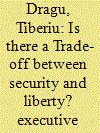| Srl | Item |
| 1 |
ID:
181667


|
|
|
|
|
| Summary/Abstract |
How will advances in digital technology affect the future of human rights and authoritarian rule? Media figures, public intellectuals, and scholars have debated this relationship for decades, with some arguing that new technologies facilitate mobilization against the state and others countering that the same technologies allow authoritarians to strengthen their grip on power. We address this issue by analyzing the first game-theoretic model that accounts for the dual effects of technology within the strategic context of preventive repression. Our game-theoretical analysis suggests that technological developments may not be detrimental to authoritarian control and may, in fact, strengthen authoritarian control by facilitating a wide range of human rights abuses. We show that technological innovation leads to greater levels of abuses to prevent opposition groups from mobilizing and increases the likelihood that authoritarians will succeed in preventing such mobilization. These results have broad implications for the human rights regime, democratization efforts, and the interpretation of recent declines in violent human rights abuses.
|
|
|
|
|
|
|
|
|
|
|
|
|
|
|
|
| 2 |
ID:
105170


|
|
|
|
|
| Publication |
2011.
|
| Summary/Abstract |
I develop a game-theoretic model of an interaction between an antiterrorist agency and a terrorist organization to analyze how the probability of a terrorist attack varies when the level of privacy protections changes. I derive two implications. First, privacy and security from terrorism need not be in conflict: when accounting for strategic interactions, reducing privacy protections does not necessarily increase security from terrorism. Second, and more important, the antiterrorist agency will always want less privacy. The very agency whose expertise affords it disproportionate influence on policy making will prefer a reduction in privacy protections even when that reduction harms security from terrorism. The analysis has implications for understanding the relationship between government powers and civil liberties in the context of terrorism prevention and times of emergencies more generally.
|
|
|
|
|
|
|
|
|
|
|
|
|
|
|
|